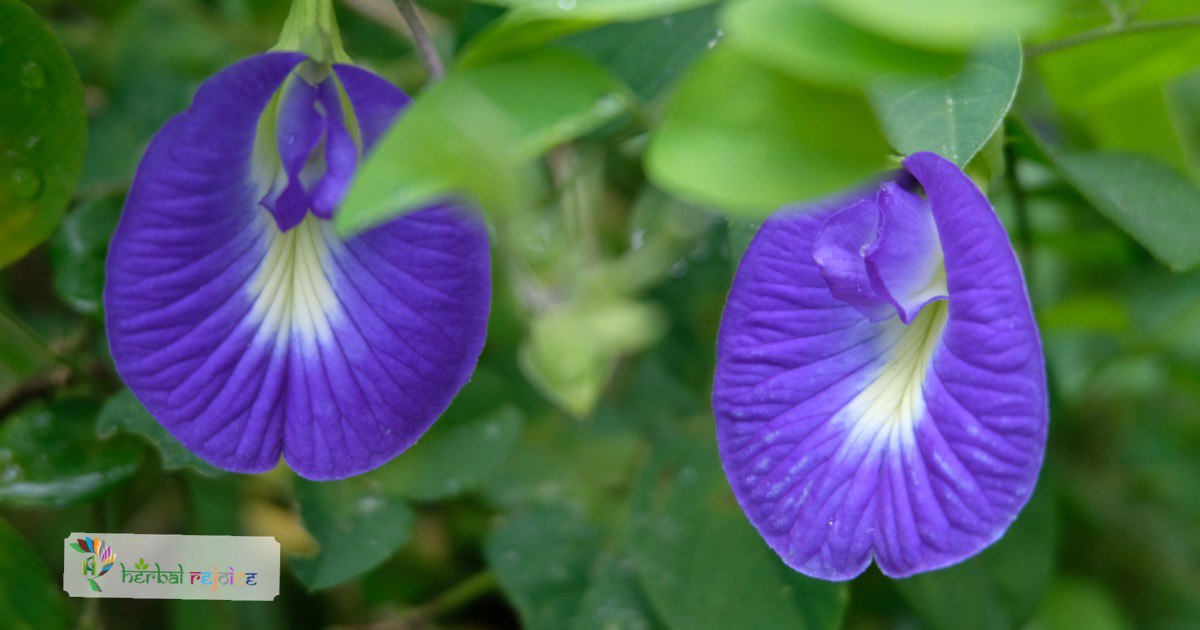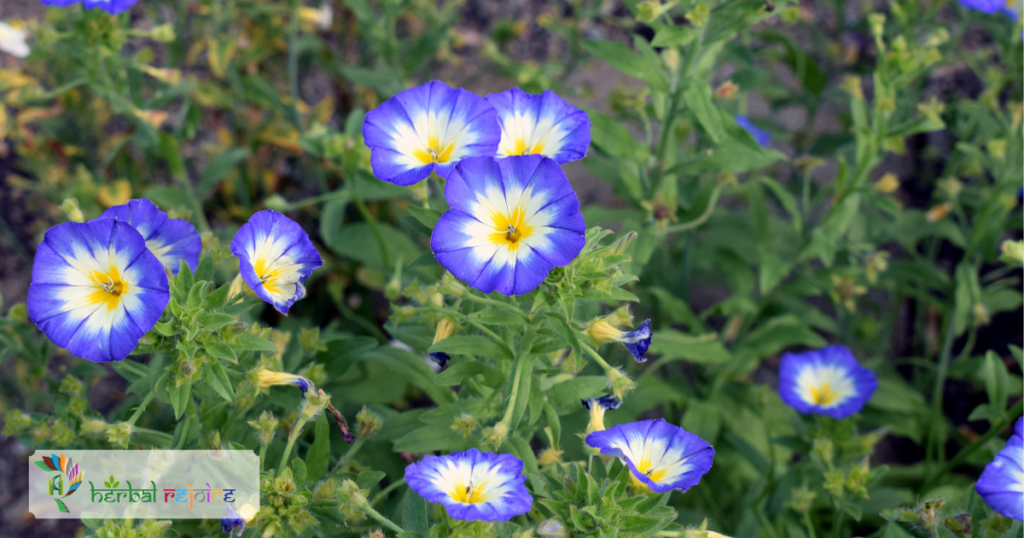Introduction To Shankapushpi
Shankapushpi(Convolvulus pluricaulis Choisy), is a flowering plant belonging to the Convolvulaceae family. It can be found throughout India, including the Himalayan region, ascending to an altitude of 2,000 meters.
In this comprehensive article, we will explore the English and scientific names of Convolvulus pluricaulis, its traditional uses in Ayurveda, Unani, and Siddha medicine, and its potential health benefits.
By delving into the unique properties and chemical composition of Shankhapushpi, we aim to shed light on the remarkable health potential of this valuable plant.
Names and Habitat Of Shankapushpi
Convolvulus pluricaulis, commonly known as Shankhapushpi, belongs to the Convolvulaceae family. It thrives throughout India, including the Himalayan region, where it can be found at altitudes of up to 2,000 meters.
Traditional Uses and Medicinal Benefits Of Shankapushpi
Shankhapushpi has a long history of traditional usage in different medicinal systems.
1)Brain Tonic and Tranquilizer
Shankhapushpi is known as a brain tonic and tranquilizer, making it useful in managing nervous disorders, mental aberration, and anxiety neurosis. It is believed to have a calming effect on the mind.
2. Internal Hemorrhages and Spermatorrhea:
This plant has been used to treat internal hemorrhages, such as nosebleeds, as well as spermatorrhea, a condition characterized by involuntary ejaculation. It is believed to have astringent and antispasmodic properties.
3. Anti-inflammatory and Alterative Effects:
Shankhapushpi is considered to have anti-inflammatory and alterative properties, thereby aiding in the reduction of inflammation and promoting overall well-being.
4. Uterine Bleeding and Fertility:
The flowers of Shankhapushpi are used as a styptic to manage uterine bleeding. Additionally, the root of the plant has been traditionally used to address gastric and duodenal ulcers, uterine affections, and promote fertility.

Chemical Composition and Key Components In Shankapushpi
Shankhapushpi contains various chemical compounds that contribute to its potential health benefits.
1. Sankhpushpine Alkaloids:
The plant contains alkaloids known as sankhpushpine alkaloids. These alkaloids are believed to play a role in the plant’s medicinal properties, although further research is needed to fully understand their effects and mechanisms.
2. Pentatriacontane, Triacontane, and Betasitosterol:
Evolvulus alsinoides, a plant often equated with Shankhapushpi, contains compounds such as pentatriacontane, triacontane, and betasitosterol. These compounds may also be present in Shankhapushpi and contribute to its bioactive properties.
Potential Health Benefits Of Shankapushpi
Shankhapushpi and its components offer promising potential for various health benefits.
1. Nervous System Support:
Shankhapushpi’s brain tonic and tranquilizer properties make it potentially beneficial in supporting the nervous system, alleviating nervous disorders and promoting mental well-being.
2. Anti-inflammatory and Anti-oxidant Effects:
The anti-inflammatory properties of Shankhapushpi may aid in reducing inflammation and supporting overall health. Additionally, its potential antioxidant effects contribute to combating oxidative stress and protecting the body’s cells.
3. Uterine Health and Fertility:
Shankhapushpi’s traditional use in managing uterine bleeding and promoting fertility suggests potential benefits for women’s reproductive health. However, further research is needed to fully understand its applications and mechanisms.
4. Gastrointestinal Support:
The root of Shankhapushpi has been traditionally used to address gastric and duodenal ulcers, indicating potential benefits for promoting gastrointestinal health.
Conclusion:
Convolvulus pluricaulis Choisy, known as Shankhapushpi, holds promising potential for various health benefits. With its traditional usage as a brain tonic, tranquilizer, and support for the nervous system, Shankhapushpi offers a natural approach to promoting mental well-being.
Its anti-inflammatory properties, along with potential benefits for uterine health, fertility, and gastrointestinal support, make it a valuable herb in traditional medicine. However, it is important to seek personalized guidance and to ensure safe and effective use.
Frequently Asked Questions (FAQs):
What is the scientific name for Shankhapushpi?
The scientific name for Shankhapushpi is Convolvulus pluricaulis Choisy.
What are the traditional uses of Shankhapushpi?
Shankhapushpi has traditional uses as a brain tonic, tranquilizer, and for managing nervous disorders, mental aberration, anxiety neurosis, internal hemorrhages, spermatorrhea, inflammation, uterine bleeding, and promoting fertility.
What are the key chemical components of Shankhapushpi?
Shankhapushpi contains alkaloids known as sankhpushpine alkaloids, as well as compounds such as pentatriacontane, triacontane, and betasitosterol.
Is there scientific research to support the health benefits of Shankhapushpi?
While Shankhapushpi has a long history of traditional usage, further scientific research is needed to fully understand its therapeutic potential and mechanisms of action.
Can Shankhapushpi support the nervous system?
Yes, Shankhapushpi’s traditional use as a brain tonic and tranquilizer suggests potential benefits in supporting the nervous system and managing nervous disorders.
Does Shankhapushpi have anti-inflammatory effects?
Shankhapushpi is believed to have anti-inflammatory properties, which may contribute to reducing inflammation and promoting overall well-being.
What potential benefits does Shankhapushpi offer for women’s health?
Shankhapushpi has been traditionally used to manage uterine bleeding and promote fertility.
Can Shankhapushpi support gastrointestinal health?
The root of Shankhapushpi has been traditionally used to address gastric and duodenal ulcers, indicating potential benefits for promoting gastrointestinal health.
Are there any known side effects of Shankhapushpi?
Specific side effects of Shankhapushpi have not been mentioned. However, individual sensitivities or allergies may exist.
Can Shankhapushpi be used in combination with medications?
It is advisable to consult with healthcare professionals if you are taking medications to ensure there are no potential interactions between Shankhapushpi and your medications.
Can Shankhapushpi be grown at home?
Shankhapushpi can be challenging to grow at home due to its specific habitat requirements. It is advisable to consult with local gardening experts or nurseries for guidance.
Can Shankhapushpi be used during pregnancy and breastfeeding?
It is advisable to consult with healthcare professionals before consuming Shankhapushpi during pregnancy or breastfeeding for personalized advice.
Where can I purchase Shankhapushpi products?
Shankhapushpi products may be available for purchase online from reputable sellers or in local markets, especially in regions where the plant is native.
How can Shankhapushpi be stored?
Shankhapushpi products should be stored according to general guidelines for herbs. It is recommended to keep them in a cool, dry place for optimal preservation.
Can Shankhapushpi be used for pets?
The use of Shankhapushpi for pets should be done with professional guidance to ensure safe and appropriate use.
Can Shankhapushpi be used for weight loss?
There is no specific mention of Shankhapushpi’s effects on weight loss.
Can Shankhapushpi be used in combination with other herbs or supplements?
Shankhapushpi can potentially be used in combination with other herbs or supplements.
How long does it take to experience the health benefits of Shankhapushpi?
The time it takes to experience the health benefits of Shankhapushpi may vary depending on individual factors and the specific condition being addressed. Consistency in use is important, and results may be gradual.
Are there any dietary restrictions when using Shankhapushpi?
There are no specific dietary restrictions mentioned for Shankhapushpi. However, it is advisable to maintain a balanced and healthy diet for overall well-being.


